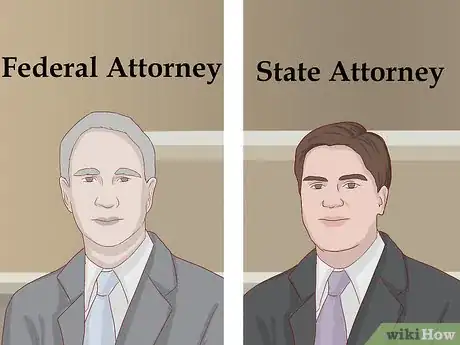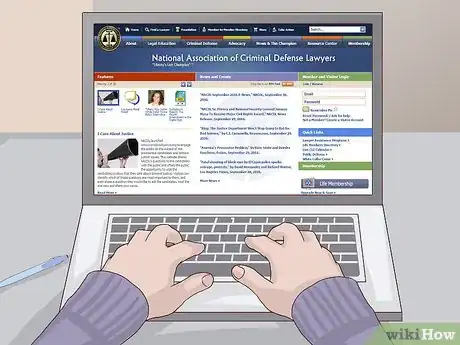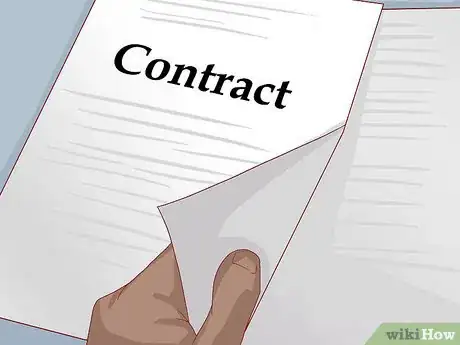This article was co-authored by Clinton M. Sandvick, JD, PhD. Clinton M. Sandvick worked as a civil litigator in California for over 7 years. He received his JD from the University of Wisconsin-Madison in 1998 and his PhD in American History from the University of Oregon in 2013.
There are 9 references cited in this article, which can be found at the bottom of the page.
wikiHow marks an article as reader-approved once it receives enough positive feedback. In this case, 87% of readers who voted found the article helpful, earning it our reader-approved status.
This article has been viewed 315,444 times.
Selecting the right criminal defense attorney for yourself or a loved one can be one of the hardest parts of any run-in with the law. It is also one of the most important. It is critical that you find a reputable attorney whom you can trust. There are several things to consider when looking for an attorney.
Steps
Determining Your Legal Needs
-
1Figure out if you need a defense attorney. If you are facing a criminal charge, no matter how minor, you should seek legal advice. Even if you decide not to hire an attorney to represent you in court, a consultation can help you to understand the charges against you. Your attorney should explain the defenses available to you, any possibilities for a plea bargain, and what your next steps would be if you were convicted.[1]
- If you are facing a serious charge, it is highly recommended that you have a defense attorney represent you in court.
- For a minor charge, you can consider simply consulting an attorney before your trial.
- To determine how serious the charge is, learn what sort of charge you are facing. A felony is the most serious type of crime. Murder and armed robbery are examples of felonies.
- A misdemeanor is a less serious charge. Shoplifting is a common example.
- Infractions are the least serious charge. Examples include traffic violations.
-
2Research the role of a defense attorney. Criminal defense attorneys are the attorneys that represent people charged with criminal conduct or have had a lawsuit filed against them. Most attorneys specialize in either criminal or civil law. Civil cases are typically brought by an individual or company, while criminal charges are brought by local, state, or federal government.
- Defense attorneys will help you with all legal issues related to your case. For example, he will identify key pretrial issues.
- Your defense attorney will issue motions that can improve your situation or possibly get your case dismissed.
- If your case goes to trial, your defense attorney is responsible for representing you in court. His objective should be to see that you receive a fair trial with a positive outcome for you.
Advertisement -
3Decide what type of defense attorney you need. You will need to determine if you need a state or federal attorney. If you have broken a state law, hire an attorney that specializes in state law. State law cases include traffic violations, broken contracts, robberies, and family disputes, among others. Federal cases include, but are not limited to, cases involving violation of the US Constitution, cases in which the United States is a party, bankruptcy cases, copyright cases, and patent cases.[2]
- If you are being charged with breaking a federal law, you will want to hire a more experienced defense attorney who will be able to dedicate a large amount of time to your case. This is because cases that involve federal law are often more complex.
- The key difference between breaking state and federal laws is that when you break a federal law, you are prosecuted by the United States Attorney's office. A prosecutor from this office has more time and resources to dedicate to prosecuting the case.
-
4Talk to the public defender. It is useful to understand the difference between a defense attorney and a public defender. Public defenders are generally reserved for people who cannot afford private attorneys. Many public defenders have limited time and resources to work on your case.[3]
- If you have limited resources and your charge is not serious, it is worth your while to consult with the public defender assigned to your case. Ask him for an honest assessment of your case.
- Ask the public defender what information he needs to help you get out on bail. You may need to help him get in touch with a family member who can access your financial information.
-
5Look for a specialized criminal defense attorney. You can search for a lawyer who concentrates his practice in the specific area of defense that you need. Many criminal defense attorneys not only handle routine criminal defense cases but some concentrate in a particular area of defense. For instance, some work exclusively on financial crimes.[4]
- Some focus on rape defense, violent crime defense, or other areas of specialty. Look for a lawyer who is willing to put in sufficient time to learn about your case and your defense.
- The State Bar Association in many states offers specialization in law and is the ultimate authority on credibility. Look at the designations offered to see if a specialization aligns with your case. The Bar Association in your state should have an informative website.
-
6Choose the qualities that are important to you. Good qualities to look for in a defense attorney include excellent communication skills, which will help him better argue your case. It might also be important to you to hire an attorney with a good track record. Don't forget to consider his experience with your specific sort of crime.[5]
- Maybe ethics are one of your priorities. Ask a friend or family member if they have worked with an attorney they respect and feel is honest.
- Consider asking the attorney to give you an example of a successful negotiation. Did the attorney get the best possible result for his/her client?
Choosing a Defense Attorney
-
1Use reputable sources to find potential attorneys. If you are charged with a crime that could cause you to have a criminal record, you need someone who is an experienced legal expert. There are several ways you can begin your search for the attorney who will best meet your needs. Use the internet or visit your local library to look at a variety of resources.[6]
- Lawyers are often members of professional organizations. States and some major cities have criminal defense lawyer organizations. Call the organization closest to you. Some organizations have online directories or provide referral services.
- Ask for a referral. If you regularly work with a lawyer or law office through your job, that lawyer may be able to recommend a defense attorney. If you have a friend or family member that has had to hire a defense attorney, he may be able to recommend (or warn against) a certain attorney.
- You can also go directly to the State Bar Website and search under Certified Criminal Law Specialist in your County.
-
2Be cautious. Don't be drawn in by flashy marketing schemes or blanket statements that assure success. Be suspicious of any attorney who guarantees you a specific result in a criminal case before making a court appearance and before reviewing all the documents and evidence. No attorney should make promises before the case truly begins.
- Ask to examine a sample contract before signing with an attorney.
- Be wary of attorneys who want a large amount of money up front to handle a case only through initial proceedings and not through jury trial. The lawyer should be honest about the likely outcomes of your case and should never make promises about guaranteed outcomes.
-
3Calculate the cost of hiring an attorney. The cost of an attorney is generally based on how complex a case is. Attorneys will typically ask for a retainer (payment) when the defense will most likely require the bringing in of expert witnesses or if there will be extensive motions made. Attorneys have a number of ways of charging for their work. These include flat fees, hourly rates and fees for specific parts of the case.[7]
- Hourly rates can be the most affordable, but are also the least predictable. It is difficult to predict precisely how much time your case will take.
- Flat fees are the most predictable but can hurt the client in cases that are complicated. Many attorneys will offer a fee agreement that offers a refundable minimum retainer but then goes up as the case goes past that amount.
- Misdemeanor cases may cost several thousand dollars in legal fees. Felony cases generally start at $5,000 and can run much higher if the felony is very serious, such as those that involve sexual assault or homicide.
-
4Arrange a consultation. It is best to have a face to face conference to determine if you feel comfortable with the attorney. Meet the lawyer and decide if you have confidence in his skills and feel confident in his analysis of your case. Remember that a consultation is not a binding agreement. You should schedule consultations with more than one attorney to make sure you are selecting the best one for you.[8]
- If you feel that there is something disagreeable about the attorney, you do not need to proceed with that specific attorney. There is nothing wrong with consulting with an attorney and then choosing not to hire him to represent you.
- Put your best foot forward. You want to impress the attorney, just as much as you want him to impress you. You both need to want to work together.
- If time allows, meet with as many as 3-4 attorneys. This will give you a choice, but is also a small enough pool to keep you from being overwhelmed.
-
5Prepare a list of questions to ask during the consultation. This will help you make sure to get all of the information that you need. It can be intimidating to meet with an attorney. By preparing questions ahead of time, you will feel more prepared and less likely to forget to ask an important questions.[9]
- Ask about fees and payment schedules. You can also ask for a list of similar cases he has worked on.
- You should ask the attorney what sort of trial strategy he would recommend. You can also ask about plea bargains and negotiations.
- Ask about your alternatives. You want to have all of your options clearly explained.
- You can ask, "Why are you the right attorney to handle this case?" The answer should give you a good idea of his plan and experience.
- You can also say, "How quickly would you begin work? What information do you need to get started?"
-
6Determine the other members of your legal team. During the consultation, ask the attorney about his staff. You should find out who will work on your case if you hire this attorney and what their experience level is when you meet with the attorney. Attorneys generally have assistants who help them fill in the blanks of the case.[10]
- You should ask specific questions about assistants and paralegals. For example, ask what rates they bill at.
- Figure out how much work the lead attorney will do. What percentage of work will these other people be doing and what percentage of time will your attorney be dedicating to your case?
- Now is also a good time to find out what would happen to your case if your attorney became ill or unexpectedly became unavailable.
-
7Discuss the facts of your case with the attorney. Find out how familiar this specific attorney is with cases that are similar to your own. Ask the attorney how he would approach your case. At this point, the attorney should be able to discuss how he will proceed. You should discuss law office communications and what ancillary services he thinks you will need, such as expert witnesses or private investigators.[11]
- The more information you can offer a criminal defense lawyer at your initial consultation, the more accurately the lawyer can offer to represent you at a realistic fee.
- Take your paperwork to the consultation with you. This includes bail paperwork, and any documents issued by the court, such as the charges filed against you, or arrest warrants.
Working With Your Attorney
-
1Allow your attorney to lead your defense. Many people feel like they understand the law. Maybe you feel like since the case involves your future, you should have a lot of input on your case. However, it is important to remember that the legal system is intricate and complex. Your attorney understands the law better than you do.[12]
- You should feel comfortable with the defense strategy. But you should refrain from telling your attorney how to do his job.
- Remember that you thoroughly reviewed his qualifications before you hired him. You likely picked someone qualified for the job.
-
2Communicate openly. While it is important that you respect your attorney's methods, it is also critical that the two of you establish a good line of communication. You should ask questions about anything that you don't understand. You should also make sure that you are comfortable with his strategies and methods.[13]
- Honesty is also key to a good working relationship. Do not ever lie to your attorney.
- In order to present the best possible defense, your attorney needs to have all of the facts. Remember, he is bound by confidentiality, so you don't need to worry about what you tell him.
-
3Get a support system. Being charged with a crime is a very emotional experience. You will likely feel scared, frustrated, and angry. Remember that it is normal to feel these, and other, emotions.
- Explain your situation to friends and family. Tell them you will need extra support during this process.
- Ask someone you trust to visit your attorney with you. This might provide some extra comfort for you.
References
- ↑ http://criminal.lawyers.com/criminal-law-basics/working-with-a-public-defender-or-court-appointed-attorney.html
- ↑ https://www.whitecollarcrimeresources.com/how-to-hire-a-federal-criminal-defense-lawyer.html
- ↑ http://criminal.lawyers.com/criminal-law-basics/working-with-a-public-defender-or-court-appointed-attorney.html
- ↑ http://www.nolo.com/legal-encyclopedia/what-look-a-private-defense-attorney.html
- ↑ https://www.hg.org/article.asp?id=35643
- ↑ http://criminal.findlaw.com/criminal-law-basics/hire-a-criminal-defense-lawyer.html
- ↑ https://www.consumer.ftc.gov/articles/0180-hiring-lawyer
- ↑ http://criminal.findlaw.com/criminal-law-basics/hire-a-criminal-defense-lawyer.html
- ↑ http://criminal.lawyers.com/criminal-law-basics/criminal-meeting-with-a-lawyer.html
- ↑ http://www.attorneys.com/criminal-defense/questions-when-hiring-a-criminal-lawyer/
- ↑ http://www.attorneys.com/criminal-defense/questions-when-hiring-a-criminal-lawyer/
- ↑ http://www.expertlaw.com/library/criminal/criminal_attorney.html
- ↑ http://www.expertlaw.com/library/criminal/criminal_attorney.html













































































